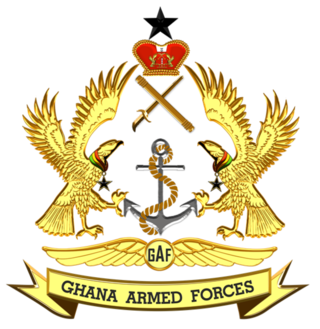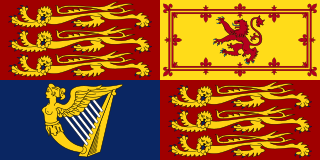
The Nigerian Armed Forces (NAF) are the military forces of Nigeria. The forces consist of three service branches: the Nigerian Army, Nigerian Navy, and Nigerian Air Force. The President of Nigeria functions as the commander-in-chief of the armed forces, exercising his constitutional authority through the Ministry of Defence, which is responsible for the management of the military and its personnel. The operational head of the AFN is the Chief of Defence Staff, who is subordinate to the Nigerian Defence Minister. With a force of more than 230,000 active personnel, the Nigerian military is one of the largest uniformed combat services in Africa. According to Global Firepower, the Nigerian Armed Forces are the fourth-most powerful military in Africa, and ranked 35th on its list, internationally.

The Republic of Sierra Leone Armed Forces are the armed forces of Sierra Leone, responsible for the territorial security of Sierra Leone's borders and defending the national interests of Sierra Leone, within the framework of the 1991 Sierra Leone Constitution and International laws. The armed forces were formed after independence in 1961, on the basis of elements of the former British Royal West African Frontier Force, then present in the Sierra Leone Colony and Protectorate.

The Gambia Armed Forces, also known as the Armed Forces of The Gambia, consists of three branches: the Gambia National Army (GNA), the Gambia Navy, and the Republican National Guard (RNG). It formerly included the Gambia National Gendarmerie (GNG) from the 1980s to 1996, when they were moved under the jurisdiction of the Ministry of the Interior. The commander-in-chief is the president of the Gambia who is currently Adama Barrow, whereas practical control is exercised by the Chief of the Defence Staff who is currently Lieutenant General Yankuba Drammeh.

A commander-in-chief or supreme commander is the person who exercises supreme command and control over an armed force or a military branch. As a technical term, it refers to military competencies that reside in a country's executive leadership, a head of state, head of government, or other designated government official.

The prime minister of Singapore is the head of government of Singapore. The president appoints the prime minister on the advice and consent of the Cabinet of Singapore. The incumbent prime minister is Lawrence Wong, who took office on 15 May 2024.

The National Security Council is a federal institutional and consultative body chaired by the prime minister of Pakistan as its chairman. The NSC is a principal forum that is mandated for considering national security and foreign policy matters with the senior national security advisers and Cabinet ministers. The idea and inception of National Security Council was first conceived in 1969 under the President Yahya Khan, its functions were to advise and assist the president and prime minister on national security and foreign policies.

The Ministry of National Defence is one of the eighteen ministries of the Government of Romania.

The Chief of the Defence Staff (CDS) is the professional head of the Ghana Armed Forces. He is thus responsible for the administration and the operational control and command of the Ghana military. The CDS is a member of the Armed Forces Council. This council advice the President of Ghana on matters of policy relating to defence and also regulates the administration of the Armed Forces. It also advises the President on the promotion of all officers above the rank of Lieutenant-Colonel or its equivalent.
Lang Tombong Tamba was the Chief of the Defense Staff of the Gambian Armed Forces until his arrest, detention and trial in an attempted coup.

Head of the Armed Forces is the position of the sovereign of the United Kingdom as commander-in-chief of the British Armed Forces. Supreme military authority vests in the monarch and extends to the exercise of several personal prerogatives. However, routine administration of the military is delegated as a matter of law to the Defence Council of the United Kingdom, a body officially charged with the direction and command of the Armed Forces. As the Defence Council and its service boards are all a part of the Ministry of Defence, which itself is a ministerial department of the Government of the United Kingdom, the prime minister makes the key decisions on the use of the Armed Forces, while the secretary of state for defence assists the prime minister in the development of defence policy and administers the day-to-day military operations.

The Supreme Council of the Armed Forces is a statutory body of between 20 and 25 senior officers of the Egyptian Armed Forces, and is headed by Field Marshal Abdel Fattah еl-Sisi and Lieutenant General Abdel Mageed Saqr. The council is convened only in cases of war or great internal emergencies. It’s the body that de facto rules Egypt since 1952, except the 2011-2013 era.

The Chief of Defence Force is the head of the Singapore Armed Forces (SAF), who holds the rank of Lieutenant-General or Vice-Admiral. The Chief of Defence Force also serves as the aide-de-camp to the president of Singapore. The current Chief of Defence Force is Aaron Beng.
Sadibou Hydara was an important Gambian military and political leader who served in various international peacekeeping operations. He later served as the Gambia's Minister of Interior and government spokesman.

Adama Barrow is a Gambian politician and real estate developer who has served as President of the Gambia since 2017.

Ousman Badjie was the Chief of the Defence Staff and of the Army of the Gambia, and Lieutenant-General in the Gambian Army, having succeeded Masaneh Kinteh to the position. He was removed from his position in March 2017.

Masaneh Nyuku Kinteh is a retired Gambian Army officer who served as Chief of the Defence Staff until his removal on 5 March 2020 by President Adama Barrow. He was the Gambian Chief of Mission in Havana, Cuba, from 2012 to 2017, and was previously Chief of the Defence Staff from 2009 to 2012. He was retired with the rank of lieutenant general in 2012, having previously also served as Deputy Chief of the Defence Staff in 2009, and shifted to the Foreign Service. He was reinstated as the Chief of Defence Staff in 2017 but redeployed him to the Foreign Service in 2020, becoming the ambassador to China.
The following lists events in the year 2017 in the Gambia.
Lieutenant General Yankuba Drammeh is a Gambian military officer who is the current Chief of the Defence Staff of the Gambia.
Yankuba Badjie was Director-General of the National Intelligence Agency under former President Yahya Jammeh from December 2013 to 2016.
Yankuba is a given name. People with this name include:

















